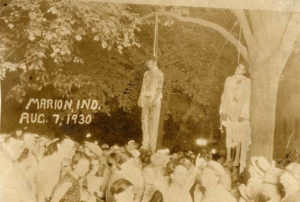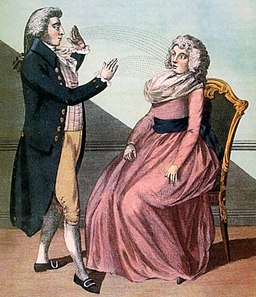
https://commons.wikimedia.org/wiki/File:Lynching_of_two_African_American_men_in_Marion_Indiana_on_7_August_1930_detail,_%22Marion,_Ind,_Aug._7,_1930%22_(NBY_3117)_(cropped).jpg
Empathy+Anger=Empathic Anger
Empathic anger rises up in us when we see someone else being mistreated and we feel outrage on their behalf. We want to defend the person, protect them. Mirror neurons make us naturals at feeling the pain of others.
I remember this most vividly from being the big sister to my three younger siblings. We had a very dysfunctional family, where both parents were emotional children raising actual children. Our dad lashed out at us when his sovereignty became threatened in any way. When my younger brother was the target, I fled to my closet to hide amongst the clothes and dolls, to muffle the sound of his crying. But one time when I was about eight years old, I didn’t run. I stood there and let the rage flood me with confidence. I yelled at my father.
“Leave him alone!”
Of course, my father then turned his dissociated rage on me. But for a few moments, I experienced the courage and truth of my anger. How dare this man take an innocent little boy and reduce him from his laughing (and yes, annoying) normal, curious self to devastated, alone, unprotected, and completely without support?!?! And why didn’t somebody protect us from this man?!?!
Going into Trance

Engraving by Dodd / Public domain
First lessons in empathic anger often get us into deep doo doo. But the emotional power remains. Sometimes the power of that empathy gets so strong and painful that we “dissociate” it. We dissociate our empathic anger by:
- Reversing the response: Deciding the person deserved to be hurt or mistreated
- Some people just don’t make good choices.
- Dulling the response: Becoming numb or confused around the injustice
- I don’t know who to believe anymore.
- Forgetting the response: Losing access to the memory of the event(s) that evoked empathic anger
- I don’t recall any abuse in our family.
All of these are trance states, and trance keeps us from acting on our anger in helpful ways.
Empathic Anger is Political
We first experience empathic anger in close-up relationships, like in our families. But think about how this works on a larger scale. Imagine what empathic anger must’ve been triggered in the audiences at lynchings in the early 20th century. When I look at old photographs of Black people being hung from trees in a public demonstration, I wonder, “How can those people stand there and watch? What must be going on inside them?”
I believe those onlookers dissociated their anger. Yes, they marinated in extreme racism that taught them to view people of color as lesser beings. But they knew – we all know on some level – the falsehood of this ideology.
What happened inside you when you saw the George Floyd video? What happens in you when you see Mexican children separated from their parents and detained in concentration camps near the border? Or when you find out that COVID-19 runs rampant in those detention centers?
This is empathic anger. Use it. Ignored, it costs us priceless energy and awakeness. We go into trance. But if enough of us lean into our empathic anger, we have a collective resource to stop the madness.
Homework: Write about witnessing someone being hurt. What do you notice about yourself in that situation? What do you notice now?
Like to Subscribe?
Get notified when Deborah shares new ideas, art, and creative health information for you.
You have Successfully Subscribed!
We respect your privacy. No information will be shared.